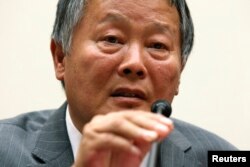Some U.S. lawmakers are urging President-elect Donald Trump and his incoming administration to recalibrate U.S.-China relations with a harder line on human rights.
"It is increasingly clear that there is direct link between China's domestic human-rights problems and the security and prosperity of the United States," Congressman Chris Smith said at a hearing of the Congressional-Executive Commission on China (CECC).
Smith, a committee co-chairman, spoke on Wednesday, ahead of International Human Rights Day on Saturday.
"Losing sight of these facts leads to bad policy, bad diplomacy and the needless juxtaposition of values and interests," Smith said. "It also sends the wrong message to those in China standing courageously for greater freedoms, human rights and the rule of law."
"Tepid responses" to Beijing on rights
Slamming what he said were "tepid responses" by the U.S. government to Chinese President Xi Jinping's crackdown this year on reformers, dissident publishers and human-rights lawyers, the Republican lawmaker called on the incoming administration to formulate policies based on improved human rights.
"I fully expect President Donald Trump will solemnly and consistently raise human-rights issues, and President Obama has not done so," Smith told VOA. "I hope the president will make it a core issue of our relationship with China, not just mixed in a number of topics."
Smith also urged Trump to sanction Chinese officials who commit serious abuses.
"We need to impose sanctions on Chinese dictators, not on the Chinese people, but on leading officials who practice torture, coercive abortion and religious persecution," he said.
New U.S. ambassador welcomed
President-elect Trump announced the nomination of Iowa Governor Terry Branstad as the next U.S. ambassador to China just hours before the hearing began Wednesday.
A Chinese Foreign Ministry spokesperson in Beijing welcomed the appointment of Branstad, described as "an old friend of China."
Wei Jingsheng, a prominent Chinese dissident in exile in the United States, believes Branstad will need to tie trade policy to human-rights issues.
"I do not think he's going to give up on human-rights goals," he told VOA. "A trend in the United States is to focus on human rights and to balance trade, which are very important goals. He will make them his mission."
Activists who testified
Chinese dissidents and rights activists including Yang Jianli, Wei Jingsheng, Chen Guangcheng, Fu Xiqiu, and Rebiya Kadeer testified at Wednesday's hearing by the CECC, along with multiple Falun Gong practitioners and Wang Xiaoan, daughter of Chinese political prisoner Wang Zhiwen.
Penpa Tsering, former speaker of the Tibetan parliament in exile and the current representative of the Dalai Lama at the Washington-based Office of Tibet, also addressed the hearing.
Tsering called on the incoming administration to implement the Tibetan Policy Act of 2002, which would direct the State Department to establish and fill a senior-level post of Special Coordinator for Tibet.
Commission created in 2000
After the hearing, lawmakers joined with those who had testified for a group photo with a large image of prominent Chinese dissident Liu Xiaobo in the background. Liu, the Nobel Peace Prize winner, was sentenced to 11 years in prison in 2009 for advocating democracy in China.
The Congressional-Executive Commission on China was created by Congress in October 2000 to monitor human rights and the development of the rule of law in China, and to submit an annual report to the president and the Congress.
Members of the commission include up to nine members of the House of Representatives and nine senators from both parties, along with five senior officials representing the Departments of State, Labor and Commerce.






